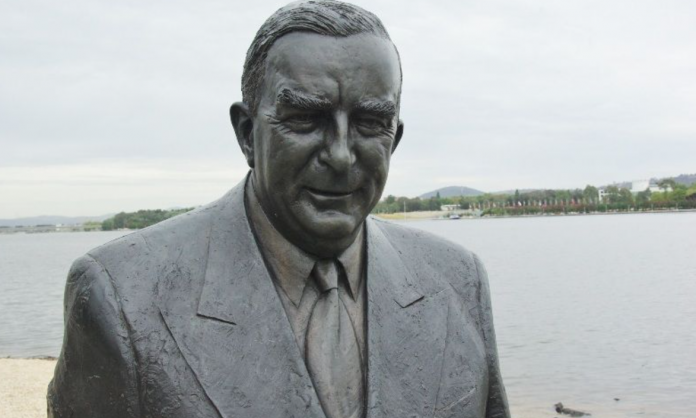The University of Melbourne is negotiating with the Menzies Research Centre, a Liberal Party-affiliated think tank, to open a museum and library dedicated to former Prime Minister Robert Menzies in the campus’s historic Old Quad. The Robert Menzies Institute, which would honour a PM notorious for Nazi sympathies and anti-communism, is set to open in September.
This semester, a campaign is kicking off that has one simple demand: get the Menzies Institute off our campus. To understand why many staff and students at Melbourne University are opposed to the administration’s plan, we have to look at who the institute is honouring.
Menzies was an ardent monarchist, architect of the modern Liberal Party and hard-right political activist. He served as prime minister in 1939-41 and again from 1949 to 1966. Through this period, he waged a concerted campaign against the unions, repeatedly used the military as strikebreakers, opened up huge tracts of Indigenous land to mining companies and pursued Australia’s imperialist interests with fervour, sending troops into Malaysia and Korea and reintroducing conscription during the Vietnam War.
His right-wing economic agenda was backed by conservative politics. Like his counterparts in the rest of the US-aligned Cold War bloc, Menzies was firmly anti-communist and in 1950 attempted to ban the Communist Party of Australia.
Unsurprisingly, this champion of big business and enemy of the left was sympathetic to the rise of the German Nazis in the 1930s. Quoted as admitting that “one cannot but admire” the way Hitler had created an authoritarian state in which individuals were subordinated to the good of the nation, Menzies was right at home with the countless ruling class politicians who backed Hitler’s project right up until it became politically untenable to do so. That in itself is enough to warrant opposition from staff and students to the proposed institute. But there’s more to it than this.
The Menzies Institute’s backers claim that it’s a non-partisan centre of intellectual and historical inquiry. This is a lie. One look at the people sitting on the board is enough to show this institute for what it is: an outpost of the hard right of the Liberal Party, which is using the platform and authority of the university to give greater credence to right-wing thought.
The board is a line-up of some of Australia’s most repulsive reactionaries, from CEO Georgina Downer, heir to one of the country’s oldest conservative political dynasties, to Sky News commentator Peta Credlin. They are joined by a host of current and former Liberal Party members and stalwarts of the country’s conservative media establishment. Collectively, they want to further a right-wing political project that’s all about reverence for the ruling class, attacking workers and waging a relentless culture war against the oppressed.
Although the centre is latching on to the university like a parasite, the relationship is reciprocal. The University of Melbourne administration has a keen interest in partnering with some of the worst elements of the Australian ruling class. Through its links with planet-poisoning corporations such as Saudi Aramco, Rio Tinto and ExxonMobil and weapons manufacturers Boeing and Lockheed Martin, the university endorses and plays an active role in maintaining the capitalist status quo.
Vice-Chancellor Duncan Maskell spent the last eighteen months attacking staff and students, cutting hundreds of jobs and slashing courses. The attack on higher education was simultaneously carried out by Scott Morrison’s federal government. It’s telling that a government that has slashed public funding to universities, and last year refused to include tertiary education workers in its JobKeeper scheme, can find $7 million to help set up the Menzies Institute.
We oppose the institute not just because of the ideas it represents, but because it would establish a precedent that political forces can buy a university platform from which to project their ideas. And it’s symptomatic of the federal government and the vice-chancellor’s agenda: to fund the interests of the rich and powerful at the expense of students and staff. The $7 million (and much more) should go towards staff wages and funding for courses.
The good news is that, although we may not have multi-million-dollar resources of our own, staff and students have the power to make our voices heard in other ways. The fight for free and fair education encompasses many related campaigns. Right now, a key fight at the University of Melbourne is for a campus in which political influence can’t be bought.








